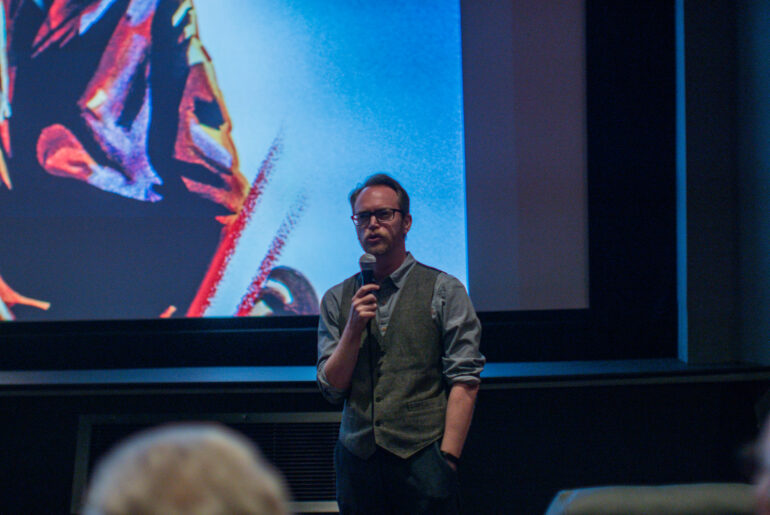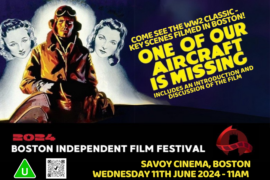As part of the Independent Film Festival (by Boston College and Savoy Cinemas) I had the chance to introduce and chat about Powell and Pressburger’s World War Two classic One of Our Aircraft is Missing – it was great to see so many people from the local area, some of whom shared memories of their family’s experiences of the war. Below is a transcript of my intro:
It was a summer’s day when seven-year-old Margaret Maddrell walked home to be confronted with a shocking site – German soldiers pacing up and down the Railway Swing Bridge. Stan Ladds, 15 at the time, had just finished peeling potatoes in the family fish shop on London Road, when he discovered the same. But both did the right thing – running back to school or home to report what all had been fearing – the German invasion of Britain had begun!
Except of course, it hadn’t. But briefly German boots marched the cobbles in Wormgate and the Nazi flag fluttered above Blenkin Memorial Hall. For during that week in August 1941 the production of One of Our Aircraft is Missing rolled into town – Boston standing in as the Dutch backdrop to this tale of six heroic airmen trying to get back home. Boston, along with Kings Lynn and the Fens, was chosen due to its visual similarity to Holland – years earlier Dutch traders and drainage engineers had left their mark on the town meaning that, with a little set dressing and some costume design, Boston became a convincing stand-in.
The production of the film created a great deal of excitement, as well as alarm – Boston’s newspaper at the time, The Mercury and Guardian, reported that ‘Boston had gone Dutch’ and that the ‘Swing Bridge had been the scene of much mystifying activity. Spectators were in their legion, and all had a different tale to tell’. There was clearly much excitement about the star Googie Withers, described in The Guardian, a little dismissively, as ‘a little lady in dungarees’. This film took Withers from being a bit part player into a start of British film – she plays Jo De Vries in the latter part of the film.
The budget was £70,000 – not a lot for this sort of film, especially as they recreated Stuttgart in model form, taking over a whole studio in Kensington (the rest of the interiors were filmed in Denham Studios in Buckinghamshire). To recreate the bombing raid cameraman Freddy Ford ‘completed the aerial camera shots by lying flat on his stomach for ten hours a day in the roof of the studio’.
Beyond the significance to Boston, this film is important for several reasons – it’s worth noting as an excellent example of stirring propaganda, produced with the Ministry of Information, to rally support not only for the RAF (who lent one of their Wellington bombers to the production), but also the Dutch resistance – made so people in Britain would know that although countries like the Netherlands were occupied they were standing and fighting with us. The filmmakers used real stories of escaping airman to inspire them – and the film carries an endorsement by the Dutch Royal Family who were in exile in London.
This was also the first time that the audience was given a glimpse inside a bomber, showing them the crew and their jobs – of course Bostonians would have seen, and heard, hundreds of bombers passing overhead but now they could be inside with the crew, finding out about the reality the RAF faced everyday. That’s why the film, at least at first, feels like a documentary, the filmmakers wanting their audience to get a real feeling of what it was like inside.
It’s also a very important film for British Film History – it was directed and written by two men, Michael Powell and Emeric Pressburger, who would go on to produce some of the most important and creative films ever made in the UK – titles such as The Red Shoes, Black Narcissus and the beloved A Matter of Life and Death. Indeed, it was the financial success of One of Our Aircraft that facilitated a new contract for Powell and Pressburger, or The Archers as they called their company, which gave them the freedom to produce their greatest films.
The film was also the debut for Peter Ustinov (some of you may know him from epics like Quo Vardis and Spartacus or as Hercule Poirot in the late 1970s and 80s), spot him a young Dutch-Catholic priest. For fans of war movies more generally, this was edited by David Lean who would go on to direct Bridge on the River Kwai and Lawrence of Arabia.
The end of the film, which I won’t spoil, also showcased a piece of Wartime technology that was previously a state secret – the filmmakers got special permission to include this in the film and highlight how the Government was helping our airmen escape capture, so watch for that.
One of Our Aircraft is Missing was a hit, garnering positive reviews when it premiered in London, and it was nominated for two Oscars, for Best Original Screenplay and Best Effects. It took nearly a year from filming for the film to find its way to the Odeon in Boston (which was in South Square): in fact, it was in June 1942, and we’re about 81 years and 11 months and 2 and-a-bit weeks away from that date today. There was more excitement when, as The Guardian describes it, ‘The Mayor and Mayoress, many Aldermen and Councillors, Justices of the Peace and their wives’ attended a Monday afternoon premier. The Guardian goes on to review it as a ‘surprisingly good film’ and ‘the shots taken at the end of Wormgate come out splendidly’ – it was ‘good entertainment’ with ‘special appeal’ for the locals.
My favourite review, however, comes from a Stoker (which was an engine room specialist in the Navy), Arthur Stephen Wright from Caroline Street in Town. Arthur was over in the other Boston when he saw One of Our Aircraft is Missing with an American audience and he reported that ‘it received magnificent applause’.
Hope you enjoy the film – we’re really lucky to get the chance to see it on the big screen as it’s meant to be seen – and I’ll be around after if anyone wants to chat about it.
References
Anon (1941). Boston Goes Dutch. The Mercury and Guardian. Wednesday 20 August, p5.
Anon (1942). Film Show at Boston. The Mercury and Guardian. Wednesday 24 June, p3.
Anon (1943). Two Boys Back from United States. The Mercury and Guardian.Wednesday 28 April, p3.
Arthur, N (n.d.). One of Our Aircraft is Missing. BFI Screenonline (online). Available at http://www.screenonline.org.uk/film/id/447446/index.html
Mould, P (1996). Wartime Schooldays in Boston. Paul Mould Publishing.
Powell, M (2000). A Life in Movies. London: Faber & Faber.



